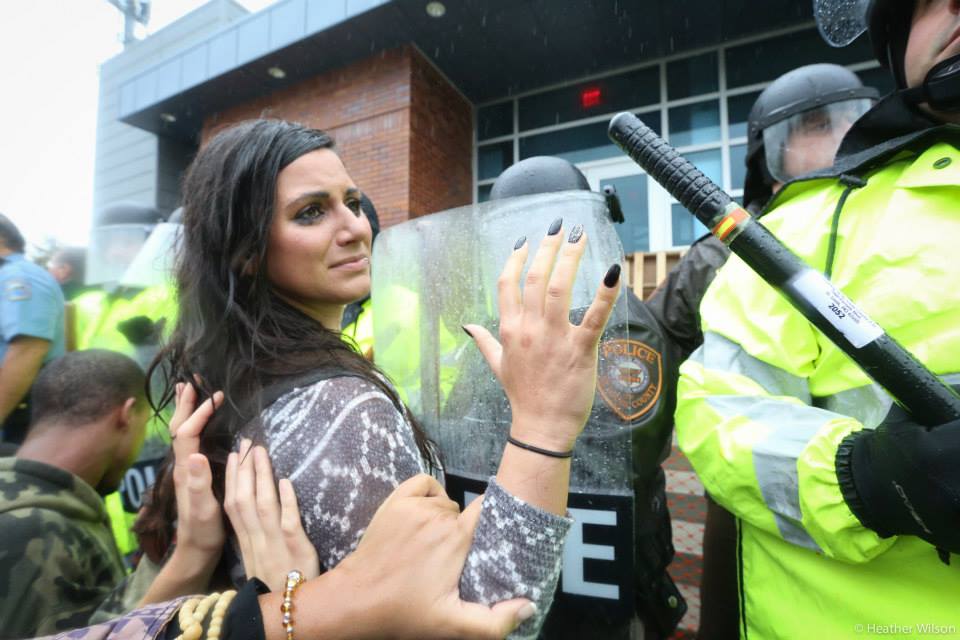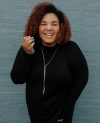June is Pride Month! We are excited to affirm and embrace everyone in the church, and to amplify the voices of our ELCA siblings in the LGBTQIA+ community. Today we are speaking with Elle Dowd (she/they).
How are you connected to the ELCA?
I grew up in the ELCA and now I am an ordained pastor. I am currently on academic leave from call to finish up my Ph.D. in queer theology, researching bisexual theology. I continue to write, speak, lead workshops and do public ministry online and in the community as an organizer, educator and author. I published a book in 2021 with the ELCA’s [publishing ministry], Broadleaf Books, titled Baptized in Tear Gas: From White Moderate to Abolitionist, which is … my own conversion story through my experiences during the Ferguson Uprising a decade ago. I am a member of Proclaim, the professional network for LGBTQIA+ rostered [ministers] and seminarians in the ELCA.
How does your faith shape and affirm your person/identity?
I have a lot of religious trauma from growing up in the church. I had always known I felt called to ministry and called to be a pastor. But at the time, queer people could not be ordained in the ELCA. I received a lot of messages about the sinfulness of my identity, which deeply harmed me. The congregation of my childhood left the ELCA after the 2009 Churchwide Assembly passed the human sexuality statement. When I pushed back on this decision, I was pushed out. Yet despite the onslaught of abuse from the institutional church, I always took comfort in the knowledge that God loved me. Even when I have felt most alienated from the church, I have never felt far from God.
Convicted, as a leader in the church, to work for justice. I am called—like we are all called—to build the kind of world where everyone has what they need to thrive. I do this work not in spite of my faith but because of it. But it hasn’t been easy. Even within the ELCA I continue to experience hate and even death threats for being a queer pastor doing the work I do. In these moments it is the love of God, the encouragement of my community, the legacy of my spiritual ancestors in Scripture and the power of the sacraments that keep me going.
How can the ELCA better support and uplift the LGBTQIA+ community?
The ELCA has to decide what kind of church it wants to be. For over a decade now we have been attempting something that seems admirable: we have aimed for a “big tent” kind of theology where everyone has a place and everyone feels welcome. This is a great idea in theory, but in reality that is not how things work. The fact is, if queer-antagonism and bi/homo/transphobia are allowed in our churches, then no LGBTQIA+ person is truly welcome. There is room for people to learn and grow. But we can’t continue to affirm theology that is killing people. The ELCA needs to move toward a full-throated, wholehearted affirmation and even celebration of LGBTQIA+ people.
We need to recognize LGBTQIA+ people as gifts, not liabilities. And by doing so, we are not doing LGBTQIA+ people some kind of favor. The fact is, the church needs LGBTQIA+ people more than we need the church. The church suffers in our absence because the body of Christ is incomplete. I often hear churches who are considering becoming [Reconciling in Christ] churches worry that they will somehow turn into the “gay church.” And some well-meaning people try to reassure those folks by saying, “Oh no, we aren’t trying to make you the gay church. We just want you to be welcoming to gay people.” But when I hear people worrying about LGBTQIA+ people taking over the church? I think to myself, “You should be so lucky.”
What advice would you give pastors, deacons, bishops or other leaders in the ELCA who are hoping to see more of the LGBTQIA+ community feel affirmed and accepted in the church?
There has been a lot of harm done by the church toward LGBTQIA+ people. This is even more true for LGBTQIA+ people who are [Black, Indigenous and other people of color] in our church, who have suffered under the dual forces of homo/bi/transphobia and white supremacy. The advice I would give to anyone who sincerely wants LGBTQIA+ people to feel affirmed and accepted in the church is that there is a lot of very serious repentance that needs to happen — not just in word but in deed as well. It is one thing to slap a rainbow sticker on your door or hang a Pride flag. What I want to know is: Are you lobbying your legislators to protect LGBTQIA+ people? Are you protesting and taking the streets when our rights are ripped away from us? Does your budget and your calendar reflect that we are a priority? Are we in your pulpits? In your liturgy? In your Sunday school illustrations? What kind of conversations are you having around reparations? How are you partnering with LGBTQIA+ organizations in your state (especially those run by [Black, Indigenous and other people of color], transgender women)?
Another thing to keep in mind is that many churches believe that they are welcoming to LGBTQIA+ people but have really only done the work to understand how to welcome cisgender, white, middle-class gay couples. Our community is incredibly diverse. Each one of those letters in our acronym has particular experiences and needs. In order to truly affirm LGBTQIA+ people, you have to commit to ongoing education and an openness to reshaping the culture.
For example, as a bisexual person, a very basic part of affirming bi people is unlearning the use of language that assumes someone’s identity based on the perceived gender of their partner. Notice how casually that happens in congregations. Notice, also, the use of unnecessary binaries like “gay and straight,” which erase all the other ways that LGBTQIA+ people show up in the world. Does your congregation have education about the phenomenon of bisexual erasure? Are you familiar with biphobic tropes and stereotypes and why they are harmful? This is the 101 level of welcoming bisexual people, and yet even many of our affirming churches are not competent in these areas. I give bisexuality as a case study and example, but that is also true about many of the other identities represented in the LGBTQIA+ acronym, and especially true of the many identities that are not included in that acronym.
Finally, I would challenge churches to move away from cis-heteronormative ideas of respectability and assimilation. Instead, learn from queer people about the radical history of our community. Part of a queer politic is resisting what we sometimes call “rainbow capitalism,” which is when corporations tokenize us in order to make a profit. A queer politic resisting assimilation is why many Pride celebrations have protested the police at Pride. Pride commemorates a riot against police led by BIPOC trans women and drag queens who were sick of being victims of constant surveillance and state violence. We don’t need cop cars with rainbows on them. We don’t need parades with MasterCard floats. We need partners in our liberation.
The same idea can be applied to churches. Churches have to really examine why they want to affirm LGBTQIA+ people. Is it so that a bunch of straight people can feel good about how welcoming they are? Or is it because you know that LGBTQIA+ people make the church better?
What gives you hope?
To be honest, the most hopeful things I experience are mostly happening outside of the church:
- Campus protests against the genocide in Palestine.
- Networks of mutual aid.
- Art, movement, deep breathing.
What do you pray for?
I pray for our collective liberation, for the dismantling of white supremacy, for an end to cis-hetero patriarchy, for the fall of capitalism and empire, for #landback, for abolition, for reparations, for restoration, for healing, for transformation, for beauty, for rest.





